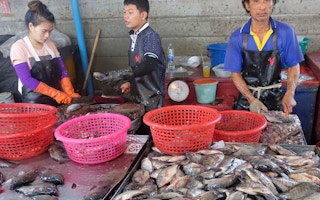The growing movement on business and human rights is hard to miss. We’ve come a long way since 2010, when the voluntary United Nations Guiding Principles on Business and Human Rights (UNGPs) ended years of international stalemate about the responsibility of corporates on human rights.
Since then, we’ve moved into unchartered territory, where in just a few years an increasing number of governments have started to require transparency from companies on human rights in their supply chains.
Today, more than 40 million people continue to be victims of modern slavery—two-thirds of them in Asia. And most of them work in industries embedded deep within global supply chains. It’s not surprising then that mandating transparency in supply chains is the next frontier in this ongoing battle.
Modern day slavery in supply chains – could this be the next ‘plastics’? Yes, said chief commercial officer Michael Fletcher of supermarket giant Co-op at a recent conference, commenting that supply chain worker treatment could have a “David Attenborough moment”, with consumers demanding corporate action in a similar fashion to the current phase-out of plastics.
The consumer movement for greater disclosure is accompanied by a recent swath of regulations globally requiring companies to put words into action.
By 2018, eight of the G20 countries had passed legislation to minimise the impact of modern slavery on supply chains. It all started with the Modern Slavery Act 2015, a ground-breaking law in the UK requiring companies with an annual turnover of more than £36 million (US$46.5 million) to publish an annual statement disclosing the steps they have taken to eliminate modern day slavery and trafficking from their supply chain.
It was a first in Europe and second globally after the California Transparency in Supply Chain Act 2010. A year later, France passed its Duty of Vigilance Law – one of the broadest measures to date. Australia then moved swiftly last month to pass its version of this legislation, the Modern Slavery Act 2018, effective from 2019 and will apply to an estimated 3,000 entities in Australia.
Similar laws are already in place in the Netherlands, US and the EU. And others like Canada and Hong Kong might be new kids on the block, with the latter having a renewed push for a law which places even civil and criminal liabilities on individuals in companies.
Could Asia be next?
This movement—though still largely confined to the West—begs an important question: Could Asia be next?
“It is likely to happen, something is already taking place. For instance, Indonesia already issued some regulations in the fishing sector. Thailand is another example of a country which may be moving in that particular direction. While it doesn’t have any regulations of that type, they have a robust system of regulating the fishing sector which has proven to be effective”, said Professor Surya Deva, Asia-Pacific representative of the United Nations Working Group for Business and Human Rights.
In August 2018, Thailand announced plans to develop a National Action Plan on Business and Human Rights (NAP) – a milestone move after allegations of modern day slavery in its fishing industry swept the nation. Slated for launch in late 2018 and led by the Ministry of Justice, the NAP will include strengthened policies requiring companies to protect human rights in the priority areas of labour, land, environment, human rights defenders and cross-border investment and multi-national enterprises.
In the aftermath of the scandal, Thailand has become an unlikely champion for business and human rights. Could this spark off a race to the top in the region?
“What is happening in Thailand and also in India—regarding the national guidelines on responsible business conduct —I think are the two biggest policy movements which may pave the way for this type of legislation”, said Livio Sarandrea, Business and Human Rights Advisor from UNDP, who is leading the team supporting the Thai government with its NAP. “I don’t think it’s impossible that this might happen. But even if it does happen, what’s even more important is that they are serious about it and implement it.”
“
This growth in the movement is necessary precisely because Asia’s economic role is ever-growing in the world. Asian countries’ investments outside and inside the region are expanding significantly.
Golda Benjamin, Southeast Asia researcher, Business and Human Rights Resource Centre (BHRRC)
Negotiations for a binding treaty
Over at the United Nations, negotiations are underway for a binding treaty requiring governments to regulate the activities of businesses. The zero draft was released on July 2018, calling for states to require companies’ compliance with human rights as a pre-condition for doing business—and not only when companies are convinced of the business case.
And interestingly, discussions also include removing the distinction between parent and subsidiaries, addressing the perennial difficulties of applying laws—often strictly territorial—to damage caused in the developing world. Professor Surya Deva wrote in his blog that compared to previous attempts by the UN, he sees this treaty having a chance for success at this point of time in history. Why?
First, the UNGPs—now widely-accepted—have set a consensus as a springboard. Second, states themselves have also realised that corporate misdeeds lead to negative outcomes—whether it’s tax evasion, interference in democratic processes, triggering internal conflicts, or claiming millions of dollars in investment arbitration awards. Thirdly, an unprecedented civil society mobilisation continues to put pressure on states to protect against corporate misconduct.
A growing civil society movement
Over the last few years, there has indeed been an observable rise in civil society’s response to corporate responsibility on human rights. Regionally, more actors have joined in the clarion call for better accountability by companies. And their voices are getting louder.
“The growing civil society momentum on business and human rights is indeed difficult to miss”, said Ismail Wolff, co-founder and executive director of the ASEAN Parliamentarians on Human Rights (APHR), who recently hired a new headcount to manage their business and human rights portfolio.
Business and Human Rights Resource Centre (BHRRC), an established research institute and keen observer in this space, observes a similar trend. “There is a growing business and human rights movement in Asia and we can see this in the growing interest on the formation of groups to look at business and human rights issues in the region”, added Golda Benjamin, their Southeast Asia researcher based in the Philippines. “This growth in the movement is necessary precisely because Asia’s economic role is ever-growing in the world. Asian countries’ investments outside and inside the region are expanding significantly”.
A growing discontent
In this part of the world, high-profile cases on human rights abuses by companies continue to fuel public outcry. We continue to learn of catastrophic dam collapses in Laos, forced evictions in Cambodia and murders of human rights defenders in India.
Against this backdrop, perhaps the case is clear: there is increasing pressure for companies to be transparent—and not only in the aftermath of such catastrophes. And companies in Asia will do well to proactively conduct robust human rights due diligence, particularly in their supply chains, keeping an eye on possible regulations coming their way.
Melissa Chong is a consultant at Corporate Citizenship. She works with companies in Southeast Asia, providing advice on areas such as strategy, materiality and community impact.


















